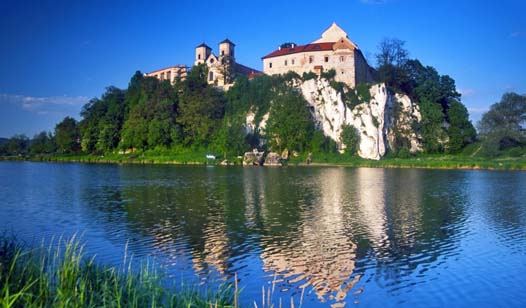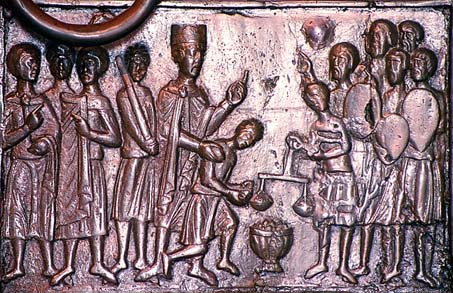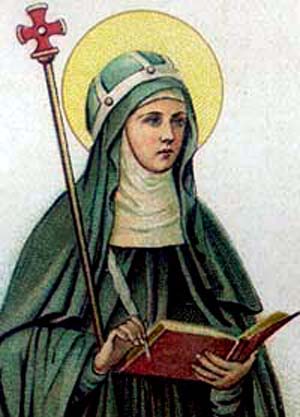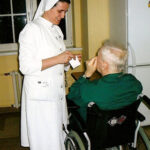 Benedictine monks live in Tyniec near Kraków. Their monastery - a cultural monument, which houses the museum of excavations from the prehistory of Poland, He brings numerous trips to Tyniec from Poland and abroad. The founder of the order was St.. Benedict. He came from a family north-east of Rome. He was born in Norcia, approx. 480 r. Of his relatives, we only know St.. Scholastykę, his sister, who also consecrated herself to God. Throughout their lives, the siblings were bound by cordial ties. Little is known about this man's youth, whose life influenced the development of culture in Europe. Only after arriving in Rome to study, does young Benedict begin to become more and more aware of his life task. Rome at that time - at the end of the 5th century - is no longer that mighty Rome. From 476 r. the empire ceased to exist, the barbarian Odoa-ker rules over Italy. The long epoch of great antiquity has passed. Benedict realized this, that building the future would require a lot of human effort and he certainly wanted to contribute to this work by then. At first it seemed to him, that voice, which he heard clearly in his soul, she calls him to a life of solitude. However, after a short stay in the Sabińskie Mountains, near Subiaco, he understood, that God had called him to a different life. Then it was on Monte Cassino in the year 529 Benedict founded a monastery, first in the West. St.. Benedict himself was an abbot (supervisor, father) this monastery. Here he wrote - at the end of a life rich in experience - his Rule. Here also died approx 574 year at the foot of the altar supported by his disciples after Holy Communion. In year 1965 Pope Paul VI proclaimed St.. Benedict "Patron of Europe". Do you know why ? Let's go back, until the migration of peoples -% IV, V, 6th century, when the entire West was devastatingly influenced by the barbarians. They took successively individual European countries. They entered everywhere by force, destroying everything with fire and sword, what they encountered along the way. Many monuments of Western culture were burnt at that time.
Benedictine monks live in Tyniec near Kraków. Their monastery - a cultural monument, which houses the museum of excavations from the prehistory of Poland, He brings numerous trips to Tyniec from Poland and abroad. The founder of the order was St.. Benedict. He came from a family north-east of Rome. He was born in Norcia, approx. 480 r. Of his relatives, we only know St.. Scholastykę, his sister, who also consecrated herself to God. Throughout their lives, the siblings were bound by cordial ties. Little is known about this man's youth, whose life influenced the development of culture in Europe. Only after arriving in Rome to study, does young Benedict begin to become more and more aware of his life task. Rome at that time - at the end of the 5th century - is no longer that mighty Rome. From 476 r. the empire ceased to exist, the barbarian Odoa-ker rules over Italy. The long epoch of great antiquity has passed. Benedict realized this, that building the future would require a lot of human effort and he certainly wanted to contribute to this work by then. At first it seemed to him, that voice, which he heard clearly in his soul, she calls him to a life of solitude. However, after a short stay in the Sabińskie Mountains, near Subiaco, he understood, that God had called him to a different life. Then it was on Monte Cassino in the year 529 Benedict founded a monastery, first in the West. St.. Benedict himself was an abbot (supervisor, father) this monastery. Here he wrote - at the end of a life rich in experience - his Rule. Here also died approx 574 year at the foot of the altar supported by his disciples after Holy Communion. In year 1965 Pope Paul VI proclaimed St.. Benedict "Patron of Europe". Do you know why ? Let's go back, until the migration of peoples -% IV, V, 6th century, when the entire West was devastatingly influenced by the barbarians. They took successively individual European countries. They entered everywhere by force, destroying everything with fire and sword, what they encountered along the way. Many monuments of Western culture were burnt at that time.
In this tragic era, the world was slowly changing. A force capable of putting order in order, include barbarians in the circle of civilization, to use their young strength, to build a new culture and civilization with their help - there were orders. Most of them adopted wise, the practical and very human Rule of St.. Benedict, which commanded to combine work with prayer. The monks rewrote the works of Greek and Latin authors. They were written on perishable material and could easily be completely destroyed or lost. There were schools in all monasteries, whose publicity attracted many students. Soon, monasteries became foci of knowledge. The monks also gathered young boys in their monasteries, they taught farming and gardening, thus creating the first ,,agricultural schools ". In addition, many towns and villages in Europe owe their origin to the monk-grubbers. The Benedictines thus became pioneers of culture and civilization throughout Europe. With time, more orders began to form, like the Franciscans (named after the founder of St.. Francis), Dominicans (from St.. Dominika), jezuici (they were founded by St.. Ignatius) and many others. Each order, apart from striving for perfection, aimed at the development of science and culture.
As in all of Europe, also in Poland, orders were centers of holiness, evangelization, culture. Already in the times of the first bishop Jordan, the Benedictines spread and deepened the faith, and with it also Western culture in Poland. St.. Wojciech founds the first Benedictine monastery in Międzyrzecz. Later, other monasteries are established throughout Poland as needed.
The orders have great merit in the field of education, which was almost exclusively in the hands of monks until the 18th century. They taught the youth to pray, work that is useful for people. Thanks to them, Christian culture took root and persisted. Wake up, which guided religious in Poland, the words of Fr.. Piotr Skarga - Jesuit and court preacher of King Sigismund III : “Their other advantage did not lead to it, only love for my brothers and sisters, and for my homeland, and for the glory of my people ". The activities of the orders were not interrupted by two world wars.
Maybe someone will say today : The monks have actually done their job, today others have taken over their task. There are ministries of education, agriculture, culture. it is true, but they are a constant reminder to the world, that much can be done in the world with and for God. The world needs the witness of a fully Christian life, people's lives, who can pray and work.










